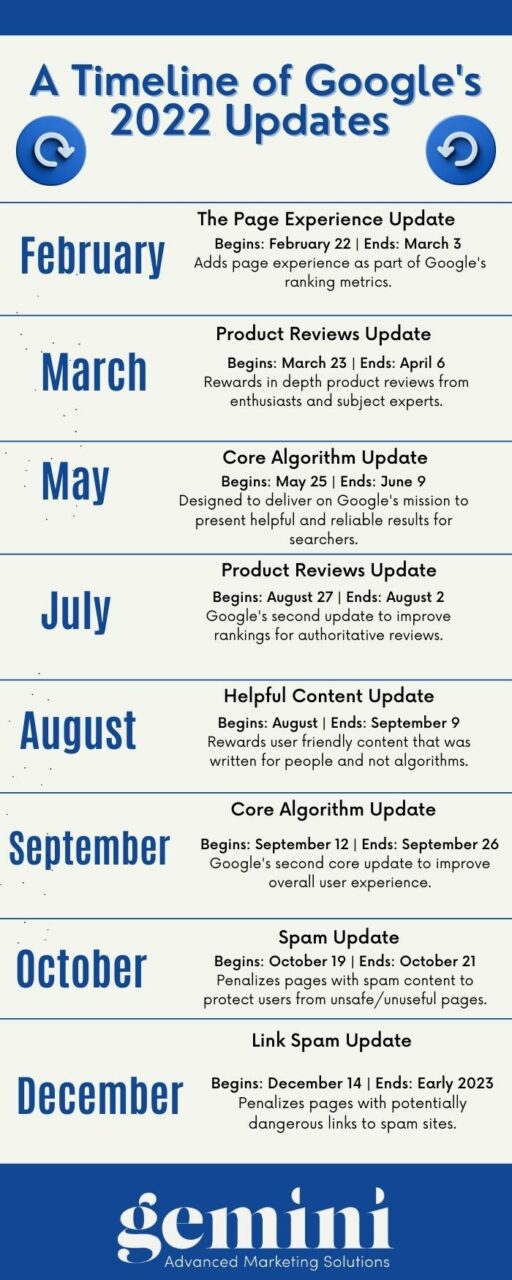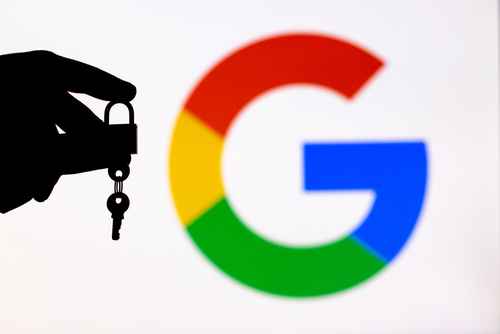Google had a busy 2022. They released numerous updates to their search algorithms including several core updates. Did these changes to the Google search engine impact your organic traffic? They could account for gains or losses you saw over the course of the year.
Let’s look at some of the more significant Google algorithm updates and how they may have affected your business. Apply this information to your 2023 marketing strategy for better results in the coming year.
February: Page Experience Update for Desktop

Google kicked off 2022 by adding page experience to their ranking factors. This means that the way users interact with your page could affect how you rank. The new metrics include:
- Largest Contentful Paint – Measures the time it takes for the largest image on a page to load. Ideally this is under 2.5 seconds.
- Cumulative Layout Shift – Tracks the visual stability of your page. Do things shift as they load? This could frustrate users who unintentionally click a link because your page shifted from the initial layout.
- First Input Delay – How fast does your site process user input? A delay could mean lower rankings. Good user experience is measured at 100 milliseconds or less.
Lesson for 2023: Tune Up Your Website
It’s no longer just the content of your pages that determines their rankings. Appearance, load time and user interface can all impact where you rank in search engine results pages (SERPs). If you haven’t yet, optimize your pages for user experience. Speed load time, reduce image file sizes and make sure that the back end of your website is as clean as the front.
March: Product Reviews Update
Product reviews have significant influence on where consumers spend their money. Google’s product review update seeks to reward thoughtful reviews that share in-depth research and experience over thinly worded opinion pieces. The intention is to give reviews with deep analysis by enthusiasts and regarded subject experts higher search rankings so that users can find them more easily and form a better understanding of a product.
This update primarily operates at the page level but sites with a large amount of review-based content may be evaluated as a whole. Google performed additional product review updates in July and September.
Lesson for 2023: Share Detailed Reviews
If you post reviews on your site, now is the time to make sure that they go beyond a simple thumbs up. Curate your reviews to include those that go into detail about your product. Even if it’s not five stars, a thorough, well written review could help boost your presence in the search results.
May: Core Algorithm Update

Core updates are generalized efforts to ensure that Google delivers on its mission to present helpful and reliable results for searchers. Core updates don’t target specific types of pages or sites. Instead, they are meant to improve the overall search experience for users. They may cause some pages that were under-rewarded to do better and vice versa.
Google uses a movie list as a metaphor for these updates. If you make a list of your favorite films and then put it in a drawer for five years, you’ll likely want to revamp the list when you revisit it. Likewise, Google reevaluates and revamps its search rankings periodically.
Lesson for 2023: Create and Optimize Good Content
Core updates seek to reward E.A.T. – expertise, authority and trustworthiness. If your content saw a dip in rankings after a core update, it may mean that someone else has created a better resource. Consider running a competitive audit and optimize your content to compete with your rivals. Identify gaps where you may not be supplying the information searchers are looking for and create new content to meet the demand.
August: Helpful Content Update
The helpful content update was one of the most significant for marketers. Its goal was “to better ensure people see original, helpful content written by people, for people, in search results.” This goal is an attempt to weed out content that is strictly written to beat Google’s algorithm. It seeks to penalize content that is stuffed with keywords and reward content people want to read.
The helpful content system boosts content that gives users a more satisfying experience. The metrics of this automated system are unclear but we can imagine Google is measuring the amount of time a user spends on a page, their willingness to return to it and whether they share it with others. Google released a second helpful content update in December.
Lesson for 2023: Create People-First Content
Google regularly posts about rewarding content that is “people-first” but what does this mean? They provide an expansive list of considerations but you can sum them up by asking: Does your content provide an original and comprehensive resource on your topic that is easy to read?
Before you start that next blog, take a look at your existing content. Is it as thorough as it should be? Is it neatly organized with clear headlines that point users to the information they seek? Can anyone understand it? Would they want to? Put yourself in the shoes of the people reading your content and give them a premium experience.

October: Spam Update
In October, Google performed a spam update. This updated the way their automated system identifies unsafe links, phishing scams and other types of spam that may include:
- Cloaking – the practice of showing different content to users vs search engines in order to manipulate rankings.
- Doorways – lead users to intermediate pages that are not as useful or relevant to their search query.
- Hacked content – content that is placed on a page without the owner’s permission.
- Hidden text and links – placing hidden text and links on a page that is not visible to humans but manipulative to search engines.
- Keyword stuffing – adding excessive and unrelated keywords to a page without providing any content of value.
- Link spam – links added for the sole purpose of increasing rankings vs adding value to the content.
- Machine generated traffic – interferes with Google’s ability to crawl and test pages.
- Malware and malicious behaviors – alters users browsers or uploads malicious software to user’s computers.
- Misleading functionality – sites that promise functions or services without providing them once on the page.
- Scraped content – sites that steal content from other, reputable sites and use it to lure users.
- Sneaky redirects – send users to a URL other than the one they think they’re clicking on.
- Spammy auto-generated content – sites with artificially generated content that is filled with keywords but makes no sense.
- Thin affiliate pages – product descriptions and reviews copied directly from original source without adding any additional value.
- User-generated spam – spam that is added to a site via user channels such as forum threads or comment sections.
By eliminating pages that contain spam from search results, Google improves search quality and makes their search engine more safe and secure for all users.
Lesson for 2023: Clean Up Your Website
Spammy content, suspicious links and malware that may have been placed without your knowledge can all compromise your rankings. Make sure that your site is clear of any of the flags that Google penalizes.
December: Link Spam Update
Similar to the October spam update, the link spam update specifically addressed links that lead to spam. After identifying potentially dangerous links on pages, Google strips them of any ranking value they may have provided.
Lesson for 2023: Audit Your Links
Auditing your website’s links periodically is always a good practice. Broken links can lead to user frustration, loss of authority and reduced traffic. If any of your links have become spammy, they could hurt your ability to rank high for your topic. By reviewing the links on your site and updating them, you keep your website competitive and safe.
Stay Ahead of Google’s Updates
A successful digital marketing campaign means staying on top of the trends and adapting when Google updates its search engine. The Gemini team vigilantly tracks Google’s activity so that our clients remain top contenders in a constantly changing digital landscape. For help with your website, content that places you as an authority and increased traffic to your business, get in touch today. We’d love to place your business ahead of the changes.